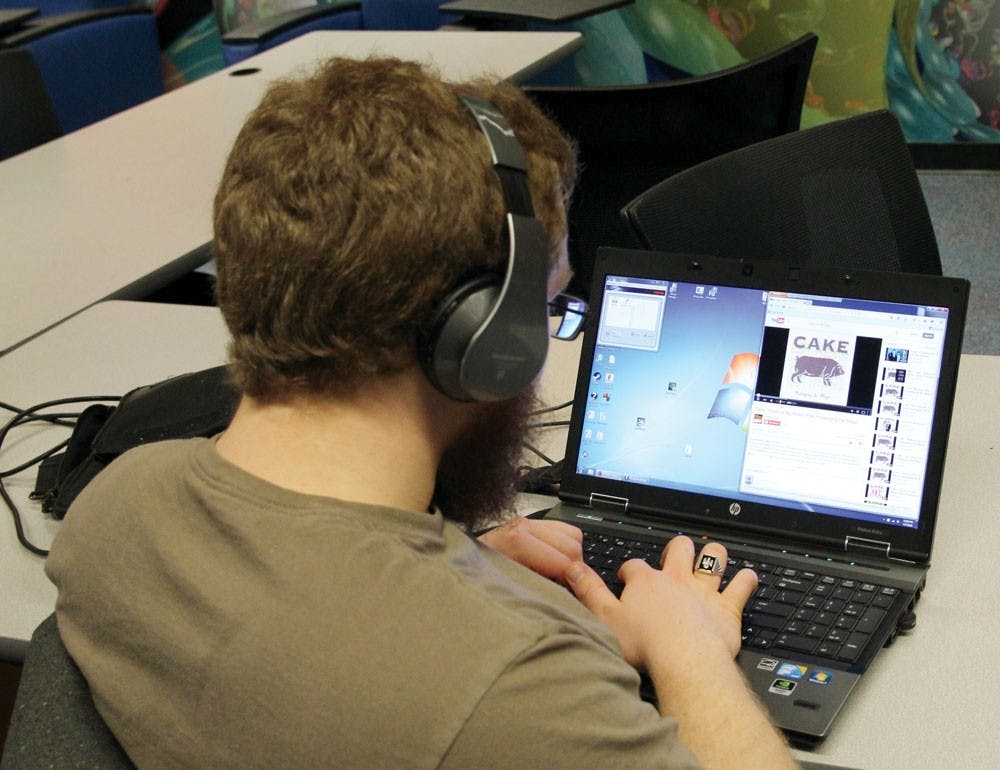Dalton Acosta finished his lab report with seven minutes to spare before the deadline. To send it in, the freshman biological sciences major needed to reconnect to the wireless server, UB Secure, which he said has always been an issue for him in his Goodyear Hall dorm.
After failing several times to connect in his room, Acosta ran to his floor lounge to try the connection there. This delay in connection made Acosta’s report late by four minutes and cost him two-points on his grade.
“Nothing too harsh, but still a bit annoying,” Acosta said. “I barely get any service [in Goodyear Hall] … my experience with the school Wi-Fi has been less than pleasant.”
UB Information Technology (UBIT) is unrolling a new plan to help students like Acosta get their assignments in on time with its new Wi-Fi Boost initiative. UBIT will be improving its wireless Internet connections starting this summer for students, faculty and staff members across the North, South and downtown Medical Campuses. The Wi-Fi boost will start over the summer.
Some outdoor areas where students walk will also be receiving Wi-Fi according to Brice Bible, vice president and chief information officer of UBIT.
“There are upwards of 100,000 devices that connect to the network … that number is increasing as technology improves,” Bible said.
Bible saidthat UBIT has not received an official quote from the various wireless providers that UB is considering for the project. An exact number will not be available until the provider is chosen and UB is trying to get the best deal, Bible said.
The Wi-Fi boost will update and add more access points across the campuses, according to Diane Tuorto, an IT communications specialist on campus. Access points are what allow a wireless device to connect to a wired network, she said. UB has around 2,800 between all three campuses, according to Tuorto.
The Wi-Fi boost initiative will cover the 150 buildings and 11.5 million square feet that make up UB, according to UBIT website. Mark Deuell, Director of Network and Classroom Services at UBIT, said to provide the desired coverage for UB they are projecting to double the number of access points on campus.
“It is not just about more access points, but a better, more reliable connection,” Tuorto said.
Each access point now can support more than 100 clients, but with limited bandwidth – or connection speed – for each of those clients. Tuorto said that the goal of the Wi-Fi boost is to reduce that number to 25 clients per access point, which would improve the connection speed.
A client is a device that can be active on the network and can include laptops, tablets and cellphones, according to Deuell.
The new access points will support the latest 802.11ac standard that can theoretically deliver 1.3 gigabytes per second to each client, according to Tuorto. The latest Wi-Fi standard is 802.11ac, which was finalized in 2013 and is three times faster than the previous 802.11n, according to Forbes.
This will be the first time UBIT will be boosting the school’s Wi-Fi since Wi-Fi was introduced at UB in 2001, according to Tuorto. Tuorto said previous installations were done incrementally over many years and never in a comprehensive Wi-Fi expansion project such as this.
“I am surprised that it took so long to begin updating the Wi-Fi,” said Emma O’Connor, a first-year graduate student in the School of Social Work. “Fourteen years and this is the first Wi-Fi boost? That amazes me, especially in the fast paced technological world we now live in.”
For the past 18 years UBIT has issued a Student Experience Survey every fall, in which students answer questions that aid in UBIT’s understanding of how technology is being used across campus. In open-ended comments in the 2014 UBIT Student Experience Survey, which can be found on the UBIT website, most students have requested that better, more reliable Wi-Fi be made available at UB.
O’Connor said the secure connection never works for her and she usually can’t get on the Wi-Fi while in class in Baldy Hall, where the School of Social Work is housed.
“Wi-Fi is critical to our ability to function on campus and I am glad UB is spending money to improve it,” O’Connor said.
Olivia Lautin, a junior accounting major, said that although she has never had problems with UB’s Wi-Fi, she is still glad to see her tuition money being spent on something as vital as Wi-Fi. She said UB’s Wi-Fi has always been pretty reliable for her.
“I live on campus so I’m always using it … having a stronger connection can only help,” Lautin said.
Tuorto said the Wi-Fi boost will start in the most densely populated areas on campus. Bible said that the Student Union will be the first area to receive a boost, followed by the larger classrooms on the campuses.
Charles W Schaab is the assistant news editor and can be reached at news@ubspectrum.com





